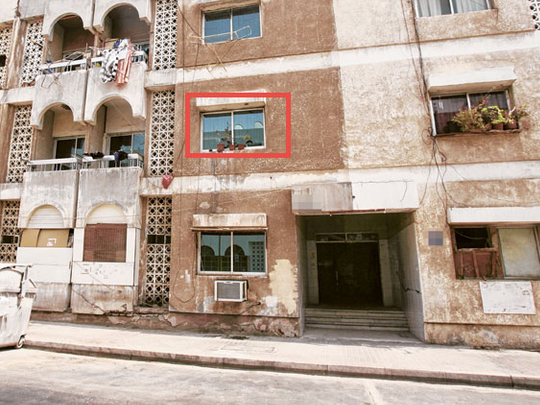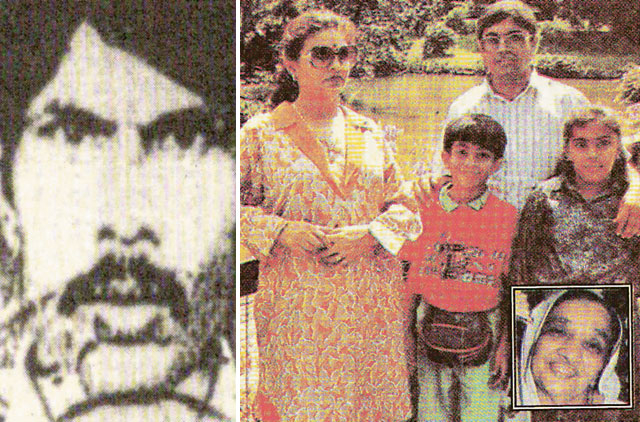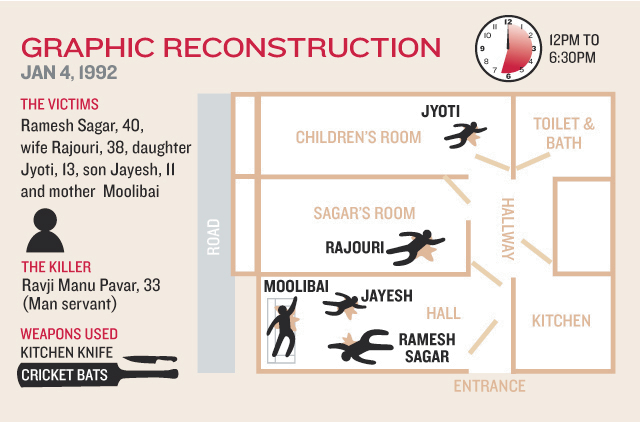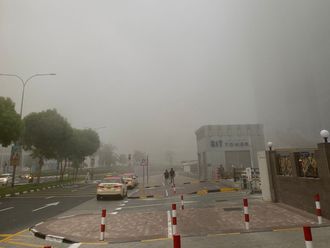
DUBAI: It's a nondescript address in the middle of an old Al Karama cluster.
The entrance is unkempt, a charred black line running across a white tiled wall on one side. The ceiling is chipped, a plastic sheet hanging underneath like an ugly hammock at one end. There are four flats on the ground floor but their doors are shut. A meter room in their midst is open though, a pile of rubble inside begging to be cleared.
As you go up the dusty staircase, you can't miss a huge trunk lying on the right. A red cycle is chained to the railing.
The apartment, where a family of five was brutally murdered by their man-servant in 1992, is on the first floor, its rectangular windows quite unlike the arched cut-outs of adjacent structures.
News of the man behind the gory killings being sentenced to death by an Indian court after two decades last week has put the spotlight again on the building, but its occupants, much like the neighbourhood itself, are oblivious to its bloody past.
"We have been living here for the past 13 years. And we are very happy," said a member of the family which now lives in the once ill-fated apartment.
At a yearly rent of Dh48,000, the two-bedroom apartment is considered a steal, especially since it is located close to the bustling market at Karama.
"I don't think we would ever want to leave this place," said the tenant.
Asked about the incident in 1992, she said she had no idea about it, adding: "We believe in God."
Clearly, life has moved on.
"I know nothing about it. We moved in 10 years ago," said another occupant of the building.
"Does it matter now?" asked a neighbour from a building across the road, "I came here five years ago."
Flashback
But on January 4, 1992, behind the dark curtains that currently cover the apartment's windows, an Indian bank employee Ramesh Sagar, his mother Moolibai Kishenbhai, wife Rajouri and their two children Jyoti, 13 and Jayesh, 11 were bludgeoned to death with cricket bats by their once trusted man-servant Ravji Manu Pavar.
One of the most gruesome multiple murders that the city had ever experienced, the incident had sent shock waves throughout the community. Those living in and around the building couldn't believe that Pavar, who had been with the family for 12 years, could have done what he had been accused of.
On that fateful day, Jyoti returned from school and was changing her clothes when Pavar attempted to rape her. When she resisted and raised an alarm, he killed her. Rajouri was the next target. One by one, Jayesh, Ramesh and Moolibai were also bludgeoned to death.
The mindless killing spree went on from 12 to 6.30 pm. And in a sick mark of revelry, Pavar even threw a party for his friends that evening. In fact, he is reported to have given a friend Dh100 to buy the wine and meat for the party.
The bodies of Ramesh and Jayesh were found on the floor of the living room. Rajouri and Jyoti lay dead in separate bedrooms. Moolibai's body was found on a couch. Two blood-stained cricket bats and a knife were also recovered from the flat.
Pavar fled the country the same evening, landing in India from where he made a call saying he had been kidnapped. But the Dubai Police, who acted swiftly following complaints by the family's relatives and friends, had alerted the Indian authorities who arrested Pavar within four days from his native village Dholar in Navsari, Gujarat. A gold chain, some bangles and a camera were recovered from him.
Special Judge R M Parmar of a Central Bureau of Investigation court in Ahmedabad in Gujarat convicted Pavar, now 53, and sentenced him to death. He held that Pavar had murdered five innocent people from one family without any provocation and described the crime as "horrific and brutal".














